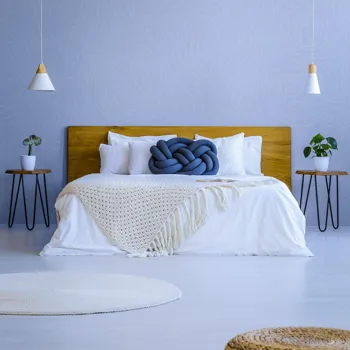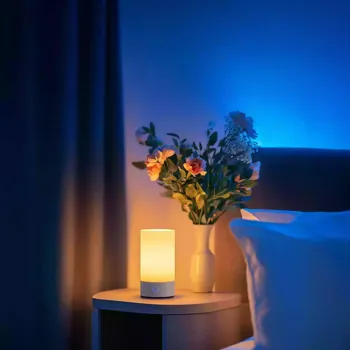Discover 7 Healthy Habits to Enhance Your Sleep Quality! Dive in to unlock the secrets of a good night's sleep
Are you feeling tired even after sleeping for what feels like ages? Do you toss and turn all
night, unable to switch off your brain, ya? Then maybe, just maybe, your sleep quality isn't up to scratch, dost. Don't worry, we've all been there!

Getting good sleep is super important for your health, just like eating your veggies and doing your yoga. It helps you focus, boosts your mood, and keeps you healthy, bhai. So, let's dive into seven healthy habits you can adopt to catch those Zzz's like a champion.
Establish consistent sleep schedule for better rest
First things first, let's talk about consistency. Imagine your body is like a clock, eh? It loves routine! Try to go to bed and wake up around the same time every day, even on weekends. Yes, even on Sundays!

This helps regulate your body's natural sleep-wake cycle, also known as your circadian rhythm. When your body knows what to expect, it's easier to fall asleep and wake up feeling refreshed, not groggy like you've been hit by a bus!
Think of it like training your body to be sleepy and awake at specific times. It might feel tough initially, especially if you're used to staying up late watching movies or scrolling through your phone.
But trust me, after a while, your body will adjust, and you'll find yourself naturally getting sleepy at your desired bedtime. So, set that alarm, stick to the schedule, and say goodbye to those sleepless nights, my friend. This regularity is half the battle won, believe me.
This will help your body to naturally adjust.
Create a relaxing bedtime routine to prepare for sleep
Now, let's discuss creating a relaxing bedtime routine. About an hour or two before you plan to sleep, start winding down, okay? This is your signal to your body that it's time to prepare for sleep. Think of it as a mini-spa treatment for your mind and body.

A warm bath can be incredibly relaxing, especially with some Epsom salts. The magnesium in Epsom salts can help relax your muscles and calm your nerves. You could also try reading a book. But make sure it's not a super exciting thriller that will keep you on the edge of your seat!
Choose something light and calming. Gentle stretching or yoga can also be great for releasing tension and preparing your body for rest. You can find many guided relaxation exercises online that can help you unwind. What's crucial is to avoid anything stimulating before bed.
That means no intense exercise, no heavy meals, and definitely no staring at screens! The blue light emitted from phones and computers can interfere with your body's production of melatonin, the hormone that regulates sleep.
Create a peaceful sleep sanctuary in your bedroom for optimal rest
Next up, let's talk about making your bedroom a sleep sanctuary. Your bedroom should be a haven of peace and tranquility, a place where you instantly feel relaxed and sleepy. This means keeping it dark, quiet, and cool, bhai.

Darkness is essential for melatonin production, so invest in some blackout curtains or blinds to block out any unwanted light. If noise is a problem, try using earplugs or a white noise machine to mask distracting sounds. A comfortable temperature is also crucial.
Most people sleep best in a slightly cool room, around 18-20 degrees Celsius. Make sure your bed is comfortable, with a good mattress and pillows that support your neck and back.
Think of your bedroom as your personal sleep cave, a place where you can escape the stresses of the day and drift off into a peaceful slumber. Get rid of any clutter or distractions, like piles of clothes or work-related items.
Your bedroom should be associated with relaxation and sleep, nothing else. Make space for oxygen.
Importance of mindful eating & drinking for better sleep
Let's chew over the importance of watching what you eat and drink, see? Avoid caffeine and alcohol before bed. Caffeine is a stimulant, so it can keep you awake and make it harder to fall asleep.

Alcohol might make you feel sleepy initially, but it can disrupt your sleep later in the night, leading to restless sleep and frequent awakenings. Instead, try drinking a cup of herbal tea, like chamomile or lavender, which are known for their calming properties.
Also, avoid eating a heavy meal too close to bedtime. Your body needs time to digest food, so eating a big meal right before bed can interfere with your sleep. If you're hungry, opt for a light snack, like a banana or a handful of almonds. Healthy food is good. These contain magnesium.
Hydration is also important, but avoid drinking too much water before bed, as this can lead to frequent trips to the bathroom during the night.
Regular exercise improves sleep quality and overall health
Fifth, incorporate regular exercise into your daily schedule. Engaging in regular physical activity can significantly improve your sleep quality. Exercise helps to reduce stress, improve mood, and regulate your body's natural sleep-wake cycle.

But make sure you don't exercise too close to bedtime, as this can actually have the opposite effect and keep you awake. Aim to exercise earlier in the day, preferably in the morning or afternoon. Even a short walk or a quick workout can make a difference.
Finding an activity you enjoy is important, so you stay motivated and stick to your routine. Whether it's jogging, swimming, dancing, or playing a sport, find something that gets your heart pumping and your body moving.
Regular exercise not only improves your sleep but also boosts your overall health and well-being.
Don't hesitate to seek professional help for chronic sleep problems
Finally, if you've tried all these tips and you're still struggling to sleep, don't hesitate to seek professional help. Chronic sleep problems can have a significant impact on your health and quality of life.
A doctor can help you identify any underlying medical conditions that might be contributing to your sleep problems and recommend appropriate treatment options. There are also specialized sleep clinics that can conduct sleep studies to diagnose sleep disorders like insomnia or sleep apnea.
Don't suffer in silence, dost. Sleep is essential for your health and well-being, so don't hesitate to seek help if you're having trouble getting enough rest. Remember, prioritizing your sleep is an investment in your overall health and happiness.
A well-rested you is a happier, healthier and more productive you, boss! So, follow these tips, and you'll be sleeping like a baby in no time, I tell you!
AI Generated Content. Glance/InMobi shall have no liability for the content


















